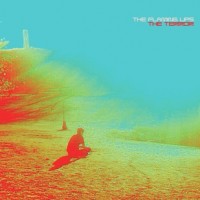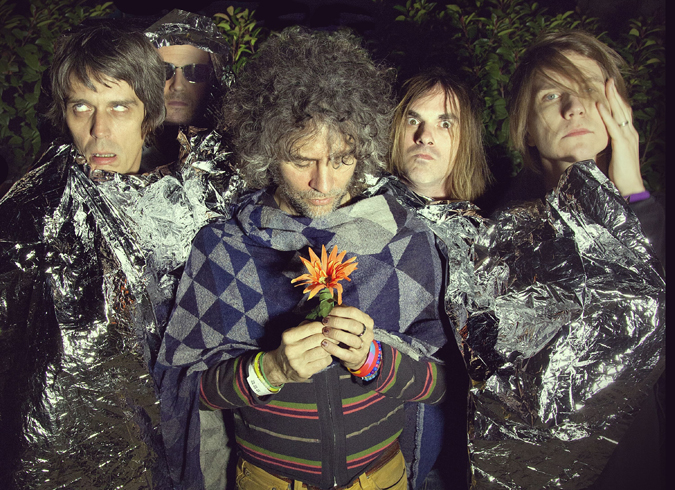 The Flaming Lips: The Terror (Warner Bros., 4/16/13)
The Flaming Lips: The Terror (Warner Bros., 4/16/13)
“Look…the Sun Is Rising”
The Flaming Lips: “Look…the Sun Is Rising”
A few lines into the opening track on the new Flaming Lips album, The Terror, front-man Wayne Coyne makes a passing reference to MKUltra, the official codename for a series of ghastly CIA mind-control experiments conducted over the course of decades on unwitting human subjects. The song, entitled “Look… The Sun Is Rising,” begins with a verse that initially suggests the bubbly surrealism Coyne is best known for. A “loud peaceful voice,” he sings, is “telling you to love” from a “little spaceship hiding in the clouds.” But, Coyne reveals, “it’s the voice of MKUltra, and you’re doing what it wants.” He then goes on to warn that “love is always something you should fear.”
In a lengthy set of press notes released by Warner Bros, Coyne describes the new music as “bleak, disturbing, and hopeless.” It’s no surprise, then, that The Terror has been painted in the same light across the media. Case in point: WBEZ music critic and Sound Opinions host Jim DeRogatis — also the author of the 2006 Flaming Lips biography Staring at Sound — excoriated the album as a “dismal and depressing dud.” But The Terror may be getting unfairly pigeonholed by the band’s own choice of words.
“Your palette can get so big that it becomes a hindrance. What do you do after you’ve been making records after so long? To me, that’s what ‘the terror’ is.”
Objectively speaking, most of The Terror’s songs made it to their finished form largely devoid of traditional instrumentation such as drums, guitars, and even chord progressions. In fact, the music verges on dissolving into a sonic vapor as the ghostlike echo of Coyne’s voice ruminates in the distance about resigning oneself to the power of love as a dispiriting, hope-crushing force. Even without Coyne’s voluminous annotations, it’s fairly evident that melancholy, uncertainty, and fear of change pervade the lyrics. Still, Steven Drozd, the band’s primary instrumentalist, instills the music with enough ambiguity and texture that the listening experience doesn’t have to be dictated by Coyne’s mood alone. For all the dread that the album title indicates, The Terror actually maintains an airy tranquility that belies its fraught emotional underpinnings.
This fundamental contrast may stem from the fact that the new material began as an off-the-cuff, low-stress diversion that was never intended as an album to begin with. As the mixing process for the 2012 collaboration album The Flaming Lips and Heady Fwends occupied the band in one studio, Drozd started working on ideas by himself in a second studio. Coyne soon caught on, and the pair found itself retreating more and more to Drozd’s ideas as a palette-cleansing relief from the “drudgery” (Coyne’s word) of mixing.
“That was part of the…maybe ‘fun’ isn’t the right word — or, I guess, maybe it is,” Drozd says. “To me, the best time you can have is when there’s no agenda, when you’re making music just to make music. This was coming after two years where we did a six-hour song, a 24-hour song, Heady Fwends, and all this other stuff where we always had deadlines. When I was working on what ended up being the song ‘You Are Alone,’ [longtime producer Dave] Fridmann was in the main room mixing. I was in another room by myself, just kind of killing time, not thinking too much about it. He’s got a whole other setup with a bunch of cool old synthesizers. Wayne heard what I was working on and reacted very strongly to it, like, ‘What is this music you’re making?’ I guess the music revealed how I felt at the time more than I realized. Wayne would be like, ‘Where did this shit come from? It just sounds so depressing and bleak!’ I was like, ‘I don’t know, but for some reason I really love it. It’s really speaking to me right now.’”
Ever since lead guitarist Ronald Jones’ departure in 1996, The Flaming Lips’ output has been routinely punctuated with fierce bouts of experimentation. After finding it difficult to define the creative direction that Coyne was pursuing on The Terror’s proper predecessor, Embryonic, Drozd felt liberated by throwing chord progressions and harmony out the window to a greater degree than the band had ever allowed in the past.
“When we’re making a record, I either go like, ‘Who gives a shit? It’s only music,’ or the other side of me is like, ‘Oh, my god, I’m in The Flaming Lips; we have to do something special!’”
“I see a similar sequence of events between what we’re doing as songwriters and what guys like [John] Coltrane and Miles Davis did,” Drozd says. “They got to the end of all the chord progressions they ever wanted to do, like, ‘We’re not doing chords anymore. We’re just gonna say we’re playing in D dorian. So do whatever you want in D dorian for 20 minutes.’ By the time we’d gotten finished with the 24-hour song, it felt to me like I’d tried every musical idea I’d ever wanted to try. So it just felt good to not worry. I didn’t know if the keyboards were in tune with each other or if they were A440. I just didn’t care. We didn’t want to concern ourselves with what chords even are.”
“Sometimes,” he continues, “that’s harder to do than you might think. Your palette can get so big that it becomes a hindrance. There’s a lot of space on this album, and a lot of things are almost not even sounds but impressions of sounds. What do you do after you’ve been making records after so long? To me, that’s what ‘the terror’ is.”
Apparently, the band has dealt with similar feelings in the past. In Blastula, a short documentary about the making of Embryonic, Coyne describes the creative search as “scary,” while Drozd talks about the “desperation” involved in coming up with new ideas.
“When we’re making a record,” Drozd explains, “I either go like, ‘Who gives a shit? It’s only music,’ or the other side of me is like, ‘Oh, my god, I’m in The Flaming Lips; we have to do something special!’”
Either way, pressure isn’t readily discernible within the new album’s nebulous clouds of keyboard perfume. If, through this music, Drozd and Coyne are urging their audience to face its fears, they’ve also managed to create a most undemanding — arguably even pleasant — sonic environment in which to do so.


The latest… just ran today.
(There ya go, @[1150986287:2048:Mike].)
(There ya go, @[1208120640:2048:Kym].)
(There ya go, @[1006189505:2048:Jay].)
(There ya go, @[552202753:2048:John]. And @[14229515:2048:John]. And @[1016280867:2048:John]. And @[584751201:2048:Kevin].)
(And @[585346392:2048:Jeremiah].)
(And @[833788901:2048:Jim] ‘n @[208300638:2048:Dan].)
(And @[1807018635:2048:Mike] and @[100001564697957:2048:Bpl].)
a fantastic read.